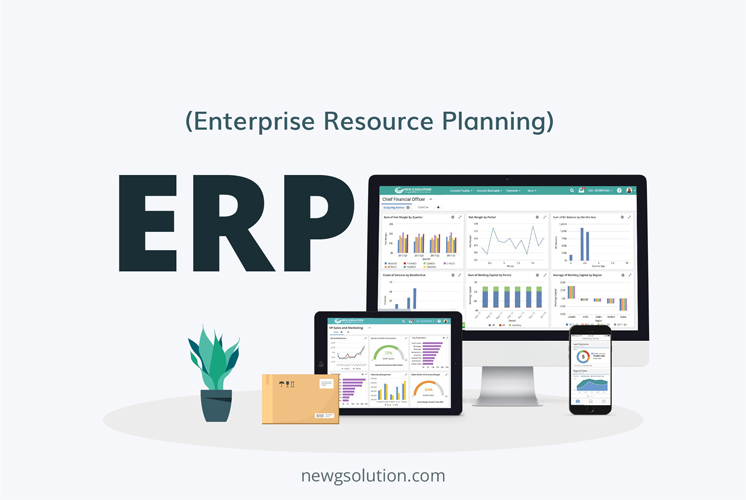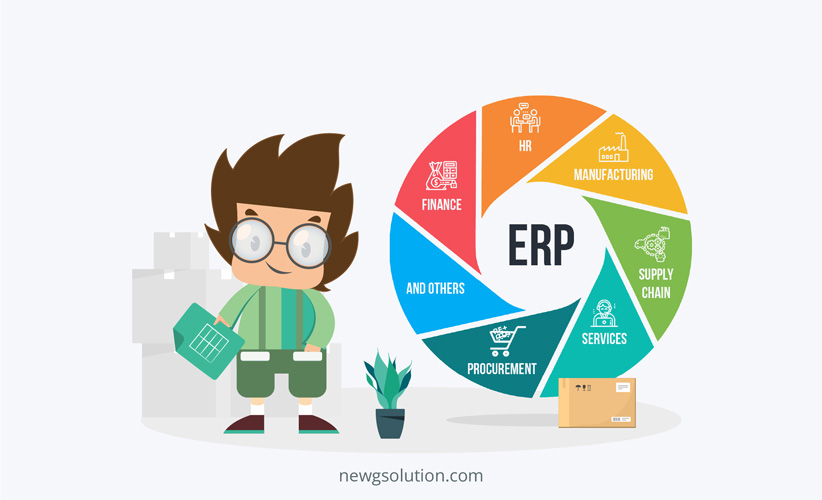How ERP System Can Transform Your Business Operations
Small Business
LAST UPDATE: MAY 12, 2023
8 minutes reading
Excel spreadsheets can only take a company so far as they expand. Software like enterprise resource planning (ERP) can only help businesses stay lean and efficient as they grow by collecting and organizing crucial data.
Although most professionals in the business world have heard the word “ERP”, they may lack a thorough understanding of what these systems actually entail and how they may benefit their companies. In this blog post, we will describe precisely what ERP software is, how it works, what it can do for your business, how to find the correct system, and much more.
Read on for responses to just about any queries you might have regarding Enterprise Resource Planning “ERP System”.
What is an ERP System?
Enterprise Resource Planning (ERP) is a sort of software solution that enables businesses to automate and efficiently manage their fundamental business processes. ERP system organizes the data flow between a company’s business processes, establishing a single point of truth and simplifying enterprise-wide operations. It can integrate a company’s finances, supply chain, operations, ecommerce, reporting, production, and human resources on a single platform.
The majority of businesses have a financial and operating system in place, but segregated systems cannot assist with the expansion of the company or expand beyond routine business activities. When businesses grow and their demands evolve, their systems should adapt accordingly.
How Does an ERP System Work?
The primary objective of an ERP system is to promote organizational efficiency by managing and optimizing the utilization of company resources. Enhancing and/or lowering the number of required resources without losing efficiency and effectiveness are essential for enhancing the growth and profitability of an organization.
Most ERP systems include all aspects of company management and provide:
- An integrated system
- Common database
- Real-time operation
- Support for all applications/components
- The standardized user interface for all applications/components
- On-premise, hosted in the cloud, or SaaS deployment
ERP software provides the capability to gather and analyze metrics between departments and generate a variety of reports based on user roles or preferences. The collected data expedites data discovery and reporting and provides a comprehensive perspective of company performance with full insights into resource utilization.
ERP syncs reporting and automation by eliminating the need to manually join disparate databases and spreadsheets in order to create reports. This integrated data collecting and reporting provides information for making real-time business choices, such as where to reduce expenses and streamline procedures.
Why Is ERP Important for Business?
ERP system is utilized to assist businesses of all kinds, from tiny businesses to multinational corporations, in overcoming obstacles. To efficiently manage a corporation’s systems and resources, more efficient management solutions, such as Enterprise Resource Planning (ERP system), may be essential.
ERP software systems contribute significantly to the health and expansion of an organization.
ERP System Advantages:
Cost Reductions and Enhanced ROI Effectiveness:
ERP software productivity will increase as a result of integration and automation.
Enhance business acumen:
Enhance decision-making with a single source of aggregated reality and actual data
Regulatory Compliance Management:
Manage and monitor regulatory compliance, and sometimes even set it up alerts for non-compliance.
Reduce and mitigate risk:
Automate fundamental business processes, manual tasks, and documenting. Reduce human error and liberate employee time and resources.
Improve collaboration:
Reduce communication barriers to facilitate effective collaboration and coordination in order to increase job productivity.
Increase the dependability of the transport and distribution network:
Utilize demand-driven MRP to predict both demand and supply and to plan for order and supply chain fluctuations.
Scalability:
Your business can expand while maintaining a consistent architecture for efficient operations.
Improve customer and business partner management:
Service, management of client relationships, as well as partnership and supplier management simplified by seamless information sharing.
Types of ERP Systems & ERP Software Deployment Options
There are three primary types of ERP systems, each with a unique implementation approach. Common ERP system types include cloud ERP, on-premise ERP, and hybrid ERP.
- Cloud-based enterprise resource planning (ERP Software) is a web-based solution known as Software as a Service (SaaS), where a company can access and save data on any internet-connected device, typically by purchasing a subscription. The software provider offers support, upgrades, education, and customizations.
- The term “hybrid ERP” refers to the installation of both cloud-based and on-premise ERP system solutions. Each provider offers a unique blend of hosting and deploying options. These models offer ERP users the ability to migrate between distribution types or include benefits not accessible in the current installation.
- On-Premise ERP software is set up on-site and maintained in real office space within a business, hosted on the organization’s own computers and servers for complete control, maintenance, and ownership of the entire system.
Which Business Operations Can Be Optimized with an ERP System?
An ERP system can cover many of your organization’s fundamental operations, breaking down boundaries between the front office and back office and allowing you to adjust your solution to changing business needs. Among the essential business functions are:
Commerce
A complete omnichannel commerce solution that unites back-office, in-store, and online experiences can be provided by an ERP system for the numerous difficulties businesses face today. Consumers enjoy a more customized and streamlined purchasing experience as a result of AI-powered recommendations, while merchants enhance employee productivity, minimize fraud, and expand their business.
Finance
Modern ERP systems improve profitability and compliance. It provides dashboards and AI-driven analytics that provide a summary of your finances and let you access real-time data from anywhere at any time. It should also reduce the amount of manual data entry by automating everyday chores and incorporating tracking capabilities that facilitate regulatory compliance.
Human Resources
Current solutions provide methods for managing firm data and streamlining staff management chores such as payroll, recruitment, and other responsibilities. You will be in a more advantageous position to assist retain, acquire, and empower staff, as well as track employee performance and anticipate HR issues in advance.
Manufacturing
This ERP feature boosts corporate communication, automates daily procedures through automated robotics, and enables manufacturers to meet consumer demands and manage resources by granting access to real-time data. In addition, the software improves project management, budget control, and production schedules.
Logistics chain
If your organization is still manually entering data and tracking down warehouse goods, you may save both money and time by automating these activities with ERP. Contemporary supply chain solutions also provide dashboards, corporate intelligence, and Internet of Things (IoT) technology to assist with inventory management.
3 Indications That You Require ERP Software
If you are suffering with your old system and reading this, you may be wondering if now is the perfect time to make a change. Here are some indications that you require a new ERP system:
- The fundamentals hinder your growth: If your present software is limiting your market expansion and ability to grow on a worldwide scale, it may be time to upgrade to a more flexible ERP system that will allow for growth.
- You’re managing dissimilar systems: As technology evolves, you are realizing that your diverse systems do not integrate smoothly. You may have discovered that your new accounting software is incompatible with your old HR system, and you’re tired of wasting time and resources attempting to cobble together a workaround.
- You can’t meet customer Demand: it is time to invest in a system that satisfies everyone’s requirements. Providing your employees with the necessary tools for success and investing in exceeding client expectations will help you keep your competitive edge.
How to Select an ERP System?
With numerous software options available, selecting and implementing an Enterprise resource planning system can be a challenging undertaking. When picking an ERP system, it is essential that the software fulfills your company’s needs and objectives and has the necessary support for ERP implementation.
This is a checklist to review while evaluating Enterprise resource planning systems for the purpose of narrowing down your selections.
Selection criteria for an ERP system:
- Does the ERP software/vendor under consideration:
- Satisfy your system requirements?
- Meet/align with corporate objectives?
- Integrate and be compatible with existing systems?
- Have network and availability of partners for local support?
- Provide training and support?
- Do you have customer references and recommendations?
- Constantly develop and enhance to employ new technologies and adapt to new situations.
In Conclusion,
an ERP system can transform your business by automating and streamlining your core processes, providing a single source of truth for your data, enhancing your decision-making with AI-powered insights, increasing your operational efficiency and agility, and connecting you with your customers and suppliers.
An ERP system can help you achieve optimal performance across your entire enterprise and deliver more value to your stakeholders. If you are looking for a reliable and flexible ERP solution that can meet your specific needs and goals, contact us today to find out how we can help you.




Recent Comments